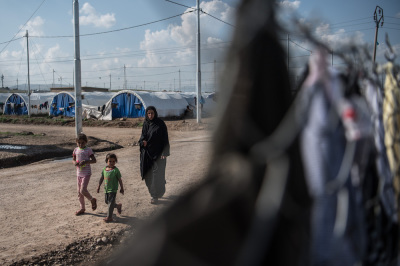Refugees are dear to the heart of God

Jesus was a refugee. Soon after his birth, an angel appeared to Joseph in a dream, warning him to take the family to Egypt so Jesus wouldn’t be killed by King Herod. And they stayed there until Herod died.
Although the world has changed in countless ways since then, Jesus’ situation generally fits the way we define refugees in the 21st century — people who are forced to leave their homeland because of war, violence, persecution, or human-rights violations.
The UN refugee agency says more than 40 million people fit that description today. Unlike illegal immigrants, they have a right under international law to seek refuge in other countries.
As we approach World Refugee Day on June 20, let’s reflect on what the Bible has to say about refugees and other displaced people, and what that means for us now.
The word “refugee” doesn’t appear in the Bible, but many verses mention strangers, sojourners, or foreigners. Moses repeatedly describes Abraham and his descendants as strangers and sojourners in the Book of Genesis.
The Old Testament chronicles the wanderings of the people of Israel and offers many examples of people who are forced from their homes, including Adam and Eve leaving the Garden of Eden, Noah and his family entering the ark to escape the flood, and Lot and his family fleeing before the destruction of Sodom and Gomorrah.
Moses gave his first son the Hebrew name Gershom, meaning stranger or exile. “I have become a foreigner in a foreign land,” Moses explained in Exodus 18:3.
That verse offers a clue about the Christian life today. Clearly, this world is not our home: 1 Peter 1:17 tells us we are living as “strangers here on earth,” and Philippians 3:20 says that “our citizenship is in Heaven.”
Unsurprisingly, many Bible verses stress the need to show kindness to strangers, sojourners, or foreigners, including Leviticus 19:33-34:
“When a foreigner resides among you in your land, do not mistreat them. The foreigner residing among you must be treated as your native-born. Love them as yourself, for you were foreigners in Egypt.”
Hebrews 13:2 says, “Do not neglect to show hospitality to strangers, for thereby some have entertained angels unawares.”
Matthew 25 makes it clear that we will be judged harshly if we neglect the “the least of these,” including the strangers among us. But if we help them, we will be rewarded. The Lord says, “Truly I tell you, whatever you did for one of the least of these brothers and sisters of mine, you did for me.”
And what is the best way to show kindness to strangers? Tell them about Jesus. The Great Commission in Matthew 28:19-20 tells us to “go and make disciples of all nations.”
That no longer means you have to travel around the world. People from nations where you could never go and preach the Gospel before live right here in our backyard today.
The vast majority of them don’t care about politics; they just want to survive.
They’re our neighbors, literally, and in a biblical sense, as well, because Jesus made clear in the Parable of the Good Samaritan that you should consider everyone in need to be your neighbor.
So whatever you think about our border policies, there’s one truth you as a Christian can’t deny: Refugees are your neighbors. Whether you voted Republican or Democratic in the last election, refugees are your neighbors. If you’ve never in your life spoken to someone from another country, refugees are your neighbors.
And what does the Bible say you’re to do to your neighbors? Love them.
Dr. Jalil Dawood, who came to America from Iraq and is now a US citizen, is the founder of World Refugee Care and the pastor of the Arabic Church of Dallas.





















